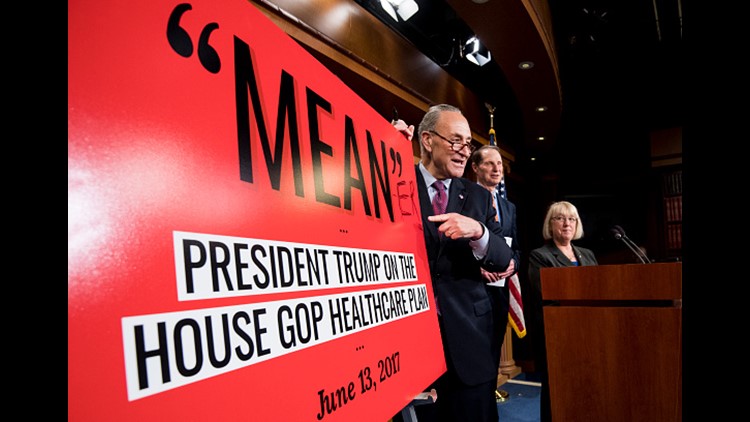Twenty-two million fewer people would have health care coverage by 2026 under the health care overhaul bill currently being considered by the Senate, the nonpartisan Congressional Budget Office estimated Monday.
CBO previously estimated that 23 million fewer people would be covered under the bill passed by the House in May. President Trump told senators two weeks ago that the House bill was "mean" and he wanted the Senate bill to have more "heart."
The numbers compare to estimates of coverage under current law, the Affordable Care Act — known as Obamacare — which Republicans have vowed to repeal.
The CBO estimates that 15 million people would be uninsured by 2018 with the number rising through 2026.
"In later years, other changes in the legislation — lower spending on Medicaid and substantially smaller average subsidies for coverage in the nongroup market — would also lead to increases in the number of people without health insurance," the analysis said.
Republican senators are considering a draft of a health care bill that would scale back federal funding for Medicaid, change the subsidies available to help low- and moderate-income people buy private insurance, end the mandate that most people buy health insurance and repeal the taxes that helped expand coverage to about 20 million Americans under the Affordable Care Act.
The proposed bill would also reduce the federal deficit by $321 billion over the next decade. That reduction is nearly triple the reduction in the House bill. The CBO said that the majority of the savings would come from reductions in Medicaid spending. The largest increases in deficits would come from getting rid of Obamacare taxes that are not directly related to health insurance coverage.
“The Senate will soon take action on a bill that the Congressional Budget Office just confirmed will reduce the growth in premiums under Obamacare, reduce taxes on the middle class, and reduce the deficit," said Majority Leader Mitch McConnell, R-Ky. He did not mention the number of people who would not have health care coverage.
The analysis said premiums would rise as much as 20% by 2018 — an election year — before trending downward after that, and by 2020 average premiums would be as much as 30% lower than current law.
The Senate bill would greatly increase the cost of health care for older people. According to CBO, individuals over age 64 making $56,800 a year could see their premiums for a silver plan triple from $6,800 to $20,500.
Senate Minority Leader Chuck Schumer, D-N.Y., said the CBO report confirms the bill is “every bit as mean” as the House bill and would lead to higher costs and less care and kick tens of millions off insurance.
“This CBO report should be the end of the road for Trumpcare,” Schumer said during a news conference. “Republicans would be wise to read it like a giant stop sign, urging them to turn back from this path that would be disastrous for the country, for middle class Americans and for their party.”
The Republican National Committee attempted to counter-program minutes after the score was released with an email that said "CBO's Long History Of Being Way Off."
The email ticked through a series of times that the CBO had not accurately modeled, including an incorrect estimate of the number of people that would enroll in the Obamacare exchanges.
More than two hours later, the White House sent their own version of a CBO bashing.
"The CBO has consistently proven it cannot accurately predict how healthcare legislation will impact insurance coverage," the White House statement said. "This history of inaccuracy, as demonstrated by its flawed report on coverage, premiums, and predicted deficit arising out of Obamacare, reminds us that its analysis must not be trusted blindly."
Meanwhile, a nonpartisan coalition of patient and consumer groups — American Cancer Society Cancer Action Network and the March of Dimes among them — urged senators to vote against the bill, saying it "will do irreparable harm to patients, particularly those living with chronic illnesses."
"I want to work w/ my GOP & Dem colleagues to fix the flaws in ACA. CBO analysis shows Senate bill won't do it," Maine Sen. Susan Collins, a moderate who had been closely watched for her vote, tweeted on Monday night. Collins said she would vote against a procedural motion for the bill to move forward.
I want to work w/ my GOP & Dem colleagues to fix the flaws in ACA. CBO analysis shows Senate bill won't do it. I will vote no on mtp. 1/3
— Sen. Susan Collins (@SenatorCollins) June 26, 2017
CBO says 22 million people lose insurance; Medicaid cuts hurt most vulnerable Americans; access to healthcare in rural areas threatened. 2/3
— Sen. Susan Collins (@SenatorCollins) June 26, 2017
Senate bill doesn't fix ACA problems for rural Maine. Our hospitals are already struggling. 1 in 5 Mainers are on Medicaid. 3/3
— Sen. Susan Collins (@SenatorCollins) June 26, 2017
“If you were on the fence and you’re looking at this as a political vote, the CBO score didn’t help you,” Sen. Lindsey Graham, R-S.C., told reporters Monday night. But Graham said he was not one of the senators being closely watched for their support.
Republican leaders are aiming to bring the bill up for a vote in the Senate sometime this week. But as of Monday, the bill — in its current form — did not have enough votes to pass. The bill will fail if more than two Senate Republicans vote against it, since no Democrats will support it. Since the bill's release last week, about a half-dozen lawmakers have expressed opposition to the legislation in its current form.
The House passed its own version of a health care bill in May. If the Senate is able to pass its legislation, another House vote will be necessary to either vote on the Senate bill or some other compromise measure.
Contributing: Maureen Groppe, Deirdre Shesgreen, Nicole Gaudiano



